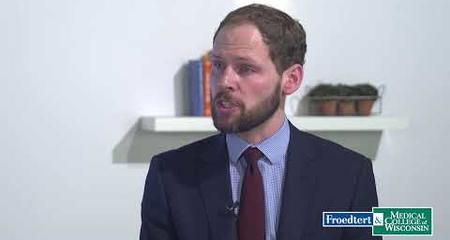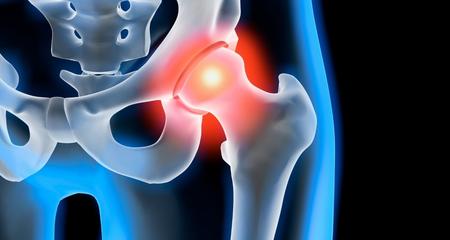Froedtert & MCW orthopaedic surgeons offer innovative treatments for common to complex forms of hip disorders. Our physicians regularly participate in collaborative research, both nationally and internationally, in this rapidly evolving area of medicine. The team specializes in treating the most complicated cases with state-of-the-art procedures.
Hip Arthroscopy
Hip arthroscopy is a minimally invasive surgical procedure in which surgeons place a small camera (arthroscope) into the hip joint. Images from the camera guide the surgeon in the use of small surgical instruments inserted through several small incisions. Traction will be used to slightly open the hip joint so the surgeon can better maneuver the instruments.
Hip arthroscopy can be used to treat femoroacetabular impingement (FAI), snapping hip syndromes, joint inflammation (synovitis) and infections, and to remove loose bone or cartilage fragments. Hip arthroscopy is typically performed as an outpatient procedure and patients usually need little or no walking assistance following surgery.
Arthroscopically Assisted “Mini-Open” Hip Surgery
Combining arthroscopy techniques and a small incision, the mini-open surgery approach gives surgeons a clearer view of the area to be repaired. The better view enables surgeons to operate in a shorter period of time with less traction, which means less pain and fewer side effects for patients. After the procedure, patients typically stay overnight in the hospital and are able to walk right away.
Periacetabular Osteotomy (PAO)
A treatment for hip dysplasia or other hip socket abnormalities, periacetabular osteotomy is an open surgical procedure in which the surgeon realigns the patient’s hip to improve function and decrease pain. This relatively new alternative to joint replacement was pioneered and is taught in Switzerland.
Froedtert & the Medical of Wisconsin is proud to have on staff one of the only PAO-trained physicians in the state. Patients undergoing PAO will usually spend two to four days in the hospital following the procedure. They can return to “desk jobs” within two weeks and typically begin weight-bearing activities after six to eight weeks.
Surgical Hip Dislocation (SHD) for the Most Complex Cases
In the case of severe hip abnormalities and complex hip conditions, surgical hip dislocation (SHD) may be recommended. Froedtert & the Medical College is the only provider of this intricate procedure in southeastern Wisconsin. We have one of the only orthopaedic surgeons in the state specially trained to do this procedure.
Surgical hip dislocation is considered major surgery. It gives the surgeon a 360-degree view of the hip joint and full access to it for major repairs and restructuring of the joint. During the procedure, the surgeon disassembles the hip joint, corrects abnormalities of both the ball and socket, and then puts the improved joint back together for healing. Patients will be hospitalized for two to four days following SHD. They can return to “desk jobs” within two weeks and begin weight-bearing activities in six to eight weeks. Within six months, most patients have no restrictions on their activities, including participation in high-impact sports.
Rehabilitation after Hip Preservation Surgery
Patients regain strength and motion after surgery through rehabilitation and physical therapy. Rehabilitation can be tailored toward particular sports or activities to which the patient wishes to return. This ensures that our patients are ready and able to return to their optimal level of activity as soon as possible.
Virtual Visits Are Available
Safe and convenient virtual visits by video let you get the care you need via a mobile device, tablet or computer wherever you are. We'll assess your condition and develop a treatment plan right away. To schedule a virtual visit, call 414-777-7700.

